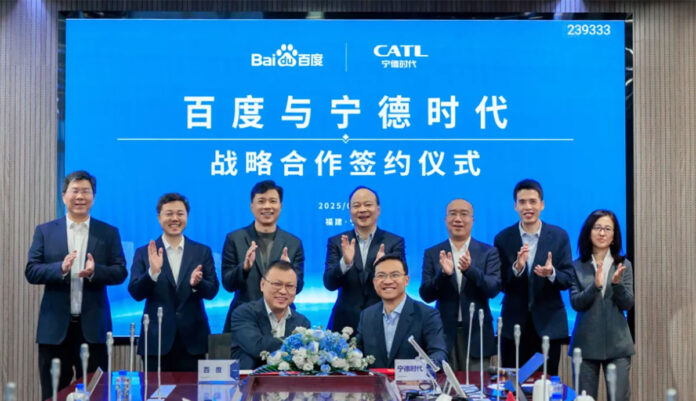Baidu and Contemporary Amperex Technology Co. Limited (CATL) have entered into a strategic partnership to collaborate on autonomous vehicle development, AI applications, and battery technology.
The agreement was signed at CATL’s headquarters in Ningde, Fujian province, with Baidu founder and CEO Robin Li and CATL chairman and CEO Robin Zeng in attendance.
Baidu’s vice president Shi Qinghua and CATL’s vice president of domestic passenger car product lines Liu Changyan signed the agreement on behalf of their respective companies. Under this partnership, the companies will focus on driverless mobility services, AI-powered manufacturing, and digitalization.
CATL’s power batteries, battery swap solutions, and skateboard chassis will be integrated into autonomous vehicles as part of this collaboration.
The companies plan to develop competitive driverless vehicle models and innovative business strategies to expand mobility services. Baidu will contribute its AI capabilities to support CATL’s digital transformation at the chip, platform, and application levels.
Baidu’s autonomous driving unit, Apollo, also confirmed the partnership, marking the first collaboration between the two firms.
CATL is the world’s largest power battery manufacturer, with a global installed capacity of 339.3 GWh in 2024, accounting for 37.9% of the market, according to SNE Research. Baidu, a key player in China’s autonomous driving sector since 2013, has launched six generations of robotaxis and operates Apollo Go, a self-driving taxi service available in over 10 Chinese cities.
In November, Apollo Go received approval to conduct testing in Hong Kong, expanding beyond mainland China. In the fourth quarter of 2024, the service handled approximately 1.1 million trips, a 36% year-on-year increase. By January, Apollo Go had provided over 9 million cumulative rides.
Baidu CEO Robin Li recently stated that Apollo Go’s fleet and ride volume are expected to grow at an unprecedented rate this year. Baidu is also seeking additional partnerships, identifying mobile service providers, local cab companies, and fleet operators as potential collaborators.




